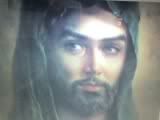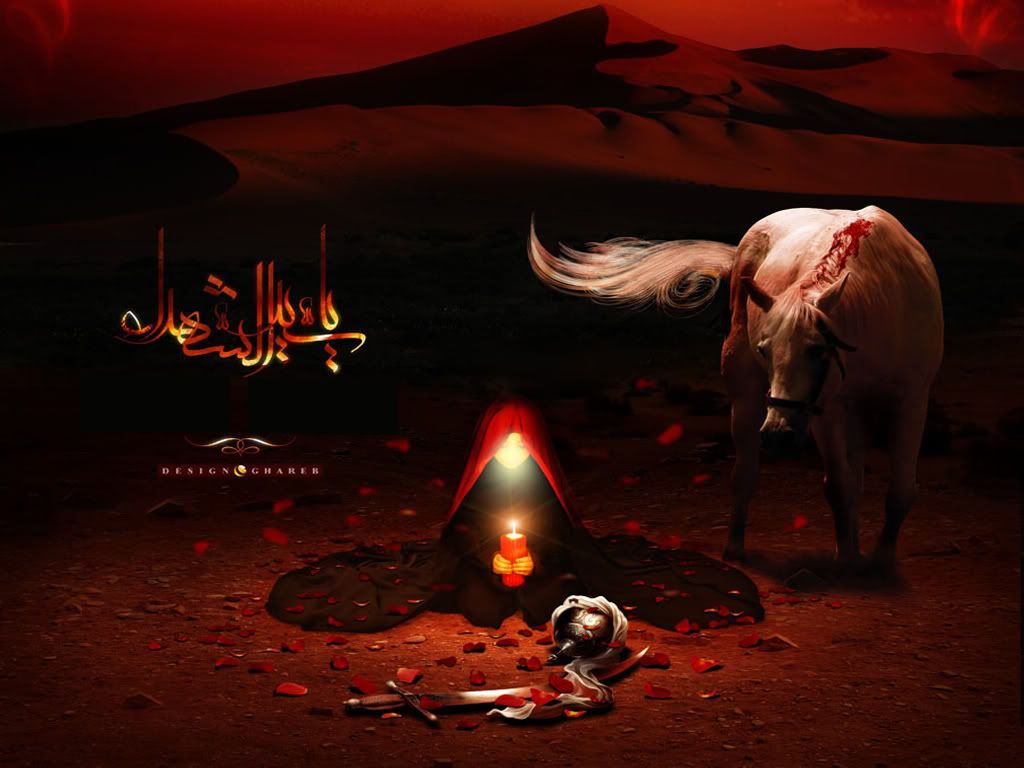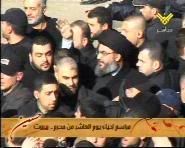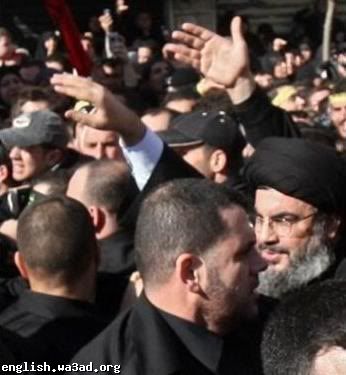"Ashura, an eternal saga of conviction and courage"
"Many westerners do not understand why it is that Shia Muslims mourn the martyred Imam Hussein as though the event did not occur a thousand years ago but as if it happened as recently as yesterday.

The 10th day of Muharram, Ashura, marks the martyrdom of the third Shia Imam, Hussein ibn Ali, in the year 680 CE/ 61 AH.
Shias beat their chests, cry and mourn, because Ashura is a sad, sad story. It is a story of cruelty, loss and grief; a story of love, faith and courage.
Hussein (PBUH), the son of the first Shia Imam and the grandson of Prophet Mohammad (PBUH), along with 72 of his faithful companions, fought the army of the Umayyad caliph Yazid bin Muawiyah who had no reverence for the Ahl al-Bayt (the Infallible progeny of the Prophet) and did not adhere to Islamic values.
One needs only envision the events leading to and of that painful day and it will be a mystery no more.
The heat and thirst have drained the children, their questioning gazes asking what their lips dare not speak for fear of embarrassing the Imam, who cannot quench their thirst as the enemy has ruthlessly prevented man, women and child from the water of life.
The Imam's brother Abbas volunteers to bring water for the camp. He advances toward the river Euphrates to fill his water sack, his fingers touching the cool surface of the water. He does not drink although every fiber in his being cries out to him to relive his thirst.
The enemy attacks and Abbas loses an arm. He picks up the water sack with his remaining limb and when that is severed he picks it up with his teeth but he is knocked out of the saddle and a blow to his head leaves him with no power to move. He calls to the Imam, 'Brother, where are you?'
The Imam fends off the enemy and rushes to his brother's side, holding Abbas, who has been blinded, in his arms until he draws his last breath.
The baby Ali has no strength left to cry and no more water left in his body for tears. The Imam decides to reason with the enemy; surely they will understand that a father cannot watch his child wither away in front of his eyes and do nothing; surely they will be moved upon seeing the six-month-old Ali's condition.
AT LAST WHEN it became sure that the devilish forces were bent upon a wholesale massacre, Husain spoke out aloud addressing the men of the Yazidian forces in an apostolic tune.
"o' people! Do ye recognise me?
By God tell me?" The reply from the enemy was: " By God, yes, We do recognise thee, Thou art the Son of the Holy Prophet."
Husain again said:-
" Do ye know me! Am I not the son of the Apostle of God?"
The reply was:-
" Yes, we do know thee, Thou art the son of the Apostle of God."
Husain said :-
" Do ye know that my father is Ali-a l-Murtaza son of Abu Taleb, and my mother is Fatema Zahra, the daughter of the Apostle of God and my grandmother is Lady Khadija daughter of Khowailad, who was the first to embrace Islam?"The reply was:-
" Yes. It is so."
Husain said: -
" By God, tell me, is not Hamza the Chief of the Martyrs of Islam, one of my uncles?"
The reply was:-
" Yes.
Husain said:-
"0' people! Do ye recognise this turban on my head, is it not the turban of the Holy Prophet and this sword at my hand, that of the Apostle of God?"
The reply was:-
" Yes we do recognise."
Husain said :-
" Do ye know that my father Ali ibne Abi Taleb was the first among men to join the Holy Prophet in the faith Islam, and he was the most learned, and the most forbearing of all men and was the ' Maula' (or the Master, Lord) of all men and women?"
The reply was:-
" Yes! We know that everything thou sayest is truth." Then Husain asked aloud:
" Say ye then, why do ye make lawful the shedding of my blood? "
The reply from the brutal forces was:-
" Yes! We shall kill thee in thy thirst."
The voice of the Holy Imam was heard in the tents in camp. The ladies and the children hearing the last reply from the enemy began to weep for Husain and Zainab and Omme Kulthoom the two sisters of Husain, the daughter of Ali and Fatema were the most effected.
Imam Hussein faces his enemies and shows them Ali, telling them he doesn't seek water for himself but for the children. He tries to persuade them, but to no avail; hostility radiates in their every response. The sound of an arrow pierces the air and there is a shower of crimson rain.
The baby's body shakes no more with dry sobs. The Imam looks down and sees the arrow in the infant's throat. Ali needs water no more. The Imam fills his hand with the lifeblood of his son and throws it to the skies, crying 'Allah, please accept this small sacrifice from me.'
How much pain can one person bear? How much loss can a person tolerate?
Imam Hussein's sister Zaynab has to be calm so as not to worry the Imam. She must conceal her anguish and give strength to all the women in the camp who look up to her. If she breaks down, so will they.
Instead, she displays strength, and carrying the weight of the world on her shoulders, never showing the slightest hint of weakness.
She has watched the torn bodies of her sons brought in one by one, her limbless brothers one after the other, and not a word of complaint has escaped her lips. She has been the same calm Zaynab whom everyone turns to in their moments of despair.
When the grief is too hard to bear, she only says, 'The will of Allah is my will.'
She is atop the hillock overlooking the battlefield now, watching her pillar of strength, her beloved brother, racing toward his destiny of martyrdom as was prophesied so many years ago.
She follows her brother with her eyes, feeling the pain of every sword blow he receives. It is almost too much to take and she drops to the ground only to stand tall again.
He races toward the enemy and her heart races after him.
Her legs again give way beneath her when she sees five-year-old Abdullah, who has slipped out of his mother's grasp, racing toward the battlefield. The little boy is running to his uncle, trying to make his attackers stop delivering blows.
His childlike logic tells him he will be able to overpower the assailants and make them leave his uncle alone. Abdullah reaches his uncle and tries to protect his body with his small hands, but blades do not understand reason.
Blood is gushing from the little boy's severed hand and he starts crying but is not willing to abandon his uncle. The Imam is near the end and has little strength left to comfort Abdullah.
'It's alright, little one…we will join your father and mine soon...soon we will be free,' he consoles the terrified child.
The attacking horde, not satisfied with shedding the blood of the Imam, raze the camp of defenseless women and children, set fire to tents, flog the petrified survivors and loot what they can lay their hands on.
The children run across the thorn-covered sand with nowhere to escape and no one to turn to. Possessing not a whiff of humanity, the savages revel in the havoc they have created.
The Ahl al-Bayt's suffering and agony is not yet over, as they will be forced to walk barefoot to Damascus. The camp, which has lost all, is forced to walk behind as the decapitated heads of their fathers, brothers and husbands precede them on spearheads.
One need not to be Muslim to be moved by the horrific incidents of those sorrowful days.
The tragedy of Ashura will leave a permanent mark on the soul of any free and compassionate spirit, regardless of religion or race. "
"
"NASRALLAH takes part in Beirut's ASHOURA March


Please read it all, thank you.
By Mohamad Shmaysani
Hezbollah Secretary General Sayyed Hasan Nasrallah took part Saturday in the Ashura March in Beirut's southern suburb along with hundreds of thousands of Muslims marking the martyrdom anniversary of Imam Hussein (peace be upon him). Men, women, children and elderly wearing black clothes, marched and chanted religious slogans renewing homage to Prophet Mohammed's grandson Hussein (peace be upon them), who was killed along with his household and companions in the land of Karbala more than 1400 years ago. Under this year's main slogan: "Disgrace, how remote," the hundreds of thousands paid homage to Imam Hussein, his grandson Sayyed Nasrallah and Hezbollah.
IMAM HUSSEIN'S UPRISING
Imam Hussein stressed that the reason for his uprising against Yazid son of Moawiya was to revive the noble teachings of Islam and the genuine practice of his grandfather Prophet Mohammed (peace be upon him and his household). Muslims, whether Sunnis or Shiites, say that Yazid who wanted to force Imam Hussein to acknowledge him as Caliphate, was a corrupt and incompetent person who practiced all sorts of wrongdoings contrary to the teachings of Islam.
IMAM HUSSEIN IN MEDINA
The martyr of Karbala, while at his grandfather's grave in Medina got his reassurances in dreams where the Messenger of God spoke to him in words of affection and great sorrow;
"Oh Hussein my beloved, I see thee soon spattered in thy blood, slain in the spot of Karbala, the spot of karb (sorrow) and bala (calamity) by a wicked gang of my community (ummah), thirsty with no one to give thee water to drink. Will they nonetheless seek my intercession nay, may God not grant them my intercession on the Day of Judgment." The Imam confronted Yazid for his open corruption and incompetence. The issue was so important for the Imam that although he could have saved himself by compromising with the oppressive government of Yazid, he rose for the interest of Islam and Muslims and sacrificed his life and that of his near and dear ones so that humanity could have an eternal model. Thus, the movement of Imam Hussein is not confined to his times. It is for every era and every place.
IMAM REACHES KARBALA
Imam Hussein reached the spot of Karbala on the second of Muharram 61 A.H. The father of free men (Imam Hussein) asked his companions what the place was called and they answered Naynawa. He asked again whether it was known by any other name. He was told that it was also known as al-Ghadiriyya. Is there any other name by which it was known? he asked. This time the answer came: "Karbala". He then remarked: "We are God's and to Him we return. This is the spot of Karb (sorrow) and Bala (calamity). This is the last station of our journey; this is the place wherein our blood will be shed."
THE TRAGEDY OF THE 10TH OF MUHARRAM
So, after nine days of attempts by the Imam to move the hearts of his enemies and reproach to them for their cruelty, came Friday or Saturday, the 10th of Muharram, 61 A.H. . This was when the greatest tragedy in Islam took place. Ibn Sa'd, the chief of Yazid's army, ordered his men to prepare for battle. He himself shot an arrow in the direction of Imam Hussein's camp saying: "Bear witness for me with the Amir (Ibn Ziyad, the ruler of Kufa) that I was the first to shoot an arrow.” The battle started and Imam Hussein's valor and devoted companions were martyred one after another, mostly in single combat.
The first to die of Imam Hussein's own family was his eldest son 'Ali al-Akbar. Then Abul Fadl al-Abbas, his brother seeing the suffering of the women and children from thirst made his way to the water among swords and spears, and under a barrage of arrows. He got the water for the thirsty ones, but on his way back he was attacked and killed after a desperate and courageous fight.
Imam Hussein called the enemy camp for a drink of water for his newborn son Abdullah. A man shot an arrow into the child's neck which slew him in his father's lap.
IMAM HUSSEIN ADDRESSES KUFANS
Just before the battle, he addressed the Kufans saying:
Do therefore remember who my ancestors were and know who I am, then return to your own consciences and reprimand them. Behold whether it is lawful for you to kill me and violate my sanctity. Am I not the son of your Prophet, the son of his legate and cousin who was the first to believe in God and confirm His Apostle in what He revealed to him. Is not Hamzah the first of martyrs my father's uncle and is not Ja'far al-Tayyar of the two wings flying in Paradise my uncle? Did no good man among you relate to you the saying of the Apostle of God concerning me and my brother 'these two are the masters of the youths of the people of Paradise'? So if you believe not what I say, and it is the truth; for by God I never told a lie since I knew that God (exalted be He) loathes lying and harms by it only those who abide in it. But if you belie me, there are those among you whom you could ask . . . (here he enumerates most of the still living companions of the Prophet and then continues) they can tell you that they heard this saying from the Prophet concerning me and my brother. Is there not in this a cause to prevent you from shedding my blood?
Among the people whose hearts were indeed moved was al-Hurr al-Amili, the man first sent by Ibn Ziyad to compel Imam Hussein to surrender.
IMAM HUSSEIN THE MASTER OF ALL MARTYRS
At the end of the day Shimr Ibn-Thee el-Jawshan urged men to kill Imam Hussein who had already received many arrows and stabs by sword and spear. The Imam lay dying on the ground spattered with his blood. It was Shimr who came forward, knelt on his chest, stabbed him many times with his sword, while the other laughed saying: "Praise God who had sent the most evil of his creatures to kill him," and then cut off his head. The head was sent with the other heads of Imam Hussein's companions first to Ibn Ziyad who dispatched them along with the women(Sabaya) including Imam Hussein's sister Sayyida Zeinab (pbuh), and children as captives to Yazid in Damascus. Only Imam Ali, Zayn al-Abidin son of Imam Hussein, then a sick boy, survived this tragedy.
BLOOD TRIUMPHS OVER SWORD
Be that as it may the martyrdom of Imam has provided food for thought and devotion for many generations up to this day. It has received countless interpretations, and every generation sees its struggle in the light of his struggle. In this sense blood triumphed over the sword and Imam Hussein peace be upon him gained victory and Yazid lost."
